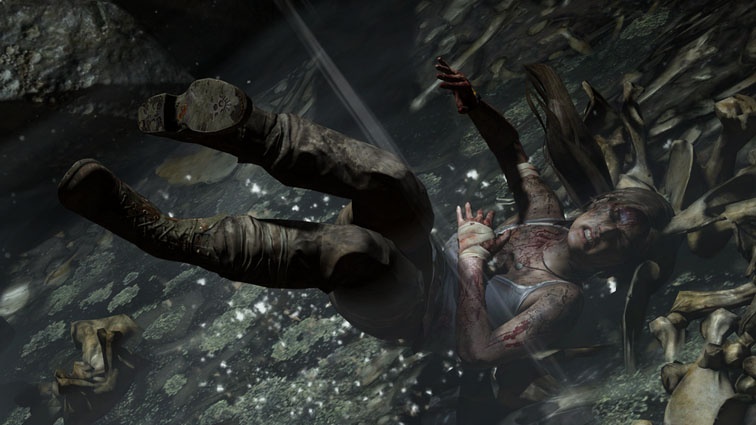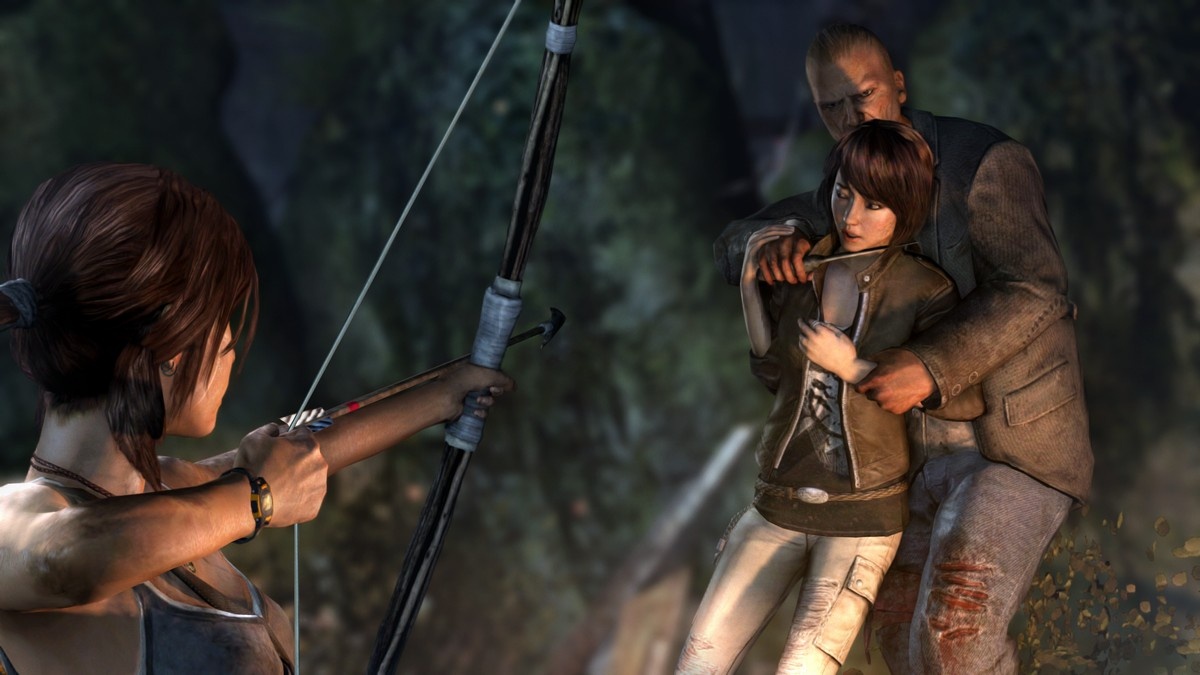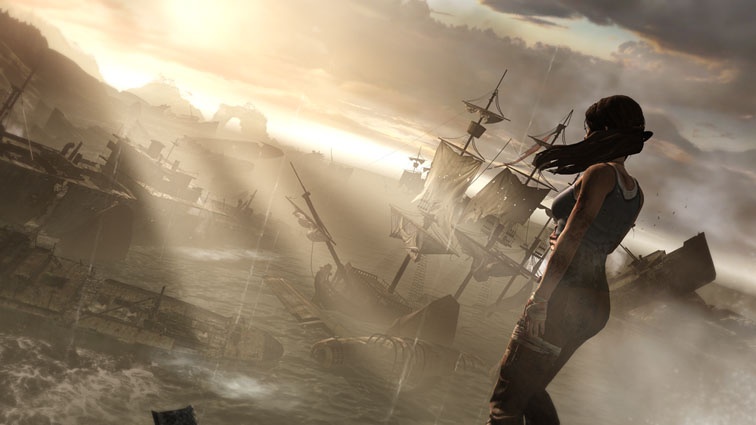The Rebirth of Lara Croft
We speak to Tomb Raider lead writer Rhianna Pratchett about redefining one of gaming's most popular heroines.
As a gamer, Rhianna Pratchett lost interest in Lara Croft a long time ago. As a writer, she's determined to bring Lara back into her life.
Pratchett has spent the last two years reworking Lara into something that she can respect, both as an artist and a gamer. In her role as lead writer for Crystal Dynamic's upcoming Tomb Raider reboot, Pratchett has the task of finding a side to Lara's personality that has been lost over the years in favour of an increasingly clichéd male sexual fantasy.
"[The way Lara was portrayed] shifted the focus away from what was particularly cool about her: the tough, action heroine and archaeology lover," Pratchett says. "It made me feel that these were games aimed squarely at guys, and therefore weren't necessarily for me."
In reimagining of Lara Croft, Pratchett wanted to give her the kind of traits one might rely on when lacking the skills and knowledge to deal with a situation (things like empathy, compassion, and introspection), qualities that were largely foreign to previous incarnations of Lara.
"In the past developers have definitely forgotten about the brains bit [when dealing with female game characters], mainly because that’s an aspect of a character that can’t be depicted visually, it has to be done through smart dialogue and appropriate action. There’s absolutely nothing wrong with a female character being attractive, even sexy, it’s just when it’s done in a purely 'tits out for the lads' way that it becomes rather embarrassing."
At first, Pratchett was afraid her aversion to Lara Croft would pose a problem for Crystal Dynamics, despite the nearly 15-years industry experience she was bringing with her (Pratchett has served as a writer on titles including Mirror's Edge, Heavenly Sword, Viking: Battle for Asgard and the entire Overlord franchise). Instead, Crystal Dynamics saw her stance as an advantage: it meant she could come to the project with a fresh perspective, and not necessarily feel beholden to everything that had come before.
It was her chance to reinvent Lara as a human being. As it turns out, that comes with problems of its own.
To date, this much-touted human side of Lara's character has been discussed using terms like "vulnerability", "honesty", and "doubt". But the things which make us human aren't always the most exciting. A cornerstone in the action adventure genre, the Lara Croft games have always been fast-paced and full of bravado, something that undoubtedly has contributed to their popularity.
The first few public gameplay demos released by Crystal Dynamics show a very different Lara Croft, a frightened creature who's not really sure what to do or how to do it. (It's worth noting however that these demos depict very early scenes in the game and, as we all know, the reboot is an origin story, meaning Lara is much younger than in past games.)
Pratchett says it was important for the team to show that Lara's future bravery and strength didn't come without fear and doubt. Like all of us, Lara questions herself, gets over-excited, and doesn't always make the best choices. Less fun perhaps than the feisty heroine the world is already acquainted with, but arguably more important.
"There can be no bravery without fear. Sometimes you don't know what the hell you’re doing, but you just know you have to do it anyway, even if it scares the shit out of you. Showing a character, male or female, who is known for being brave and confident at a time when they weren't is risky. But we feel the way we're trying to bring out Lara's character during the course of the game and show her on that journey to Tomb Raider-hood is pretty powerful stuff for players to experience. We're playing the long game with Lara."
Part of playing the long game also means delving deeper into aspects of Lara's past that define her early character, particularly her relationship with her own family's wealth and her determination to be independent. Pratchett was adamant that players had a little more to latch on to this time, highlighting Lara's warmth and compassion and her relationship with other characters in the game. Of course, Pratchett injected a little of her own personality into Lara where she felt it was appropriate to do so. (As a result, Lara now likes Jaffa Cakes, "one of the things that truly put the 'great' in Great Britain".)
But more than anything, Pratchett wanted to show the truth about Lara, a truth that isn't necessarily pretty or comfortable.
It was this idea that drew Crystal Dynamics into controversy earlier this year over a scene that was initially believed to depict Lara in the midst of an attempted rape. Though this was eventually rectified, the public backlash was swift: many condemned what they perceived to be a serious error in judgement on behalf of those tasked with re-writing Lara's character (at the time, it was unknown that Pratchett was among them), questioning the motives of any developer who would use sexual assault as an attempt to define a character's personality.
The question is why were people so offended? Where does it say that a video game can't explore a topic like rape? How can we defend video games as a storytelling medium with the power to change the way people view the world if we refuse to give developers the power to make a difference?
"Although we weren't doing so in Tomb Raider, I see no reason why games can’t touch upon these themes, or even explore them," Pratchett says. "That is as long as it’s not done for titillation, but in a thoughtful way, with integrity and context. The world doesn't need any more Japanese rape-simulators. But we simply can’t call ourselves a serious storytelling medium if we exclude topics which are routinely covered in weeknight soap operas."
Pratchett points to films like The Accused and The Girl with the Dragon Tattoo as instances in which sexual assault is explored in an uncomfortable but ultimately powerful way. She says the reaction to the Tomb Raider controversy was as much about people's perceived notions about why such a scene had been put in the game in the first place, namely as a cynical attempt to get players to feel sorry for Lara and want to protect her, as it was about the inclusion of the scene itself.
For her part, Pratchett doesn't want to tell people how they should feel about the new Lara, particularly in the scenes where Lara is a victim to the power of others. While these scenes are intended to be uncomfortable to watch, they have been constructed with the purpose of drawing out players' desire for self-preservation.
"The link between player and player character is a uniquely personal one," Pratchett says. "Personally, whether I’m a hulking Tauren druid, a boy with psychic powers, or Lara Croft, I inhabit that character. I am them and they are me. That’s largely the approach I tried to bring to my work."
For the other, more complex conversation surrounding the representation of female characters in video games, Pratchett doesn't have a simple solution. For her, it's not so much a case of fixing how females are represented in games as it is about fixing how everyone is represented. She says developers need to put more thought into creating diverse, nuanced characters that accurately reflect the wide spectrum of demographics found in the real world. And they can start by paying more attention to game writers and encouraging more women to work in game development.
"Easier said than done, I know, but I don’t think enough effort is put into making young women aware of what opportunities there are in games," Pratchett says.
"The audience for games tends to be much more diverse than the industry producing those games. If we grew, matured and diversified with our audience, then we’d probably be a much more creatively rich and welcoming industry."
'Got a news tip or want to contact us directly? Email news@gamespot.com



Join the conversation